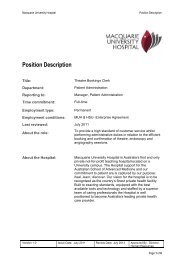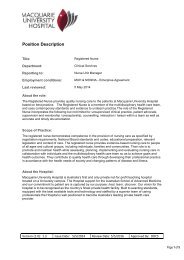Plenary Oral Presentations - Macquarie University Hospital
Plenary Oral Presentations - Macquarie University Hospital
Plenary Oral Presentations - Macquarie University Hospital
You also want an ePaper? Increase the reach of your titles
YUMPU automatically turns print PDFs into web optimized ePapers that Google loves.
16 th International Meeting of the Leksell Gamma Knife ® SocietyMarch 2012, Sydney, AustraliaMA-297Early detection of brain metastasis by routine brainscanning in selected cancer patients doubles survivaland increases quality of life1Laura L.E. Ventrella, 2 Nicoletta Cacciari, 1 Enrico Giugni, 1 Federico Rampa, 2 Marta Cubelli,2Sara Quercia, 2 Claudio Zamagni, 1,3 Enrico D.F. Motti1Neurosurgery Dept, Maria Cecilia <strong>Hospital</strong>, Ravenna, Italy2Medical Oncology Addarii, Policlinico Santâ€Orsola, Bologna, Italy3Neurosurgery, <strong>University</strong> of Milano, Milano, ItalyObjective: According to the literature 20-40% of cancer patients develop brain metastases (BM).Increasing efficacy of contemporary treatment of the primary tumor with attendant longer survivaltimes and failure of chemotherapy to cross the blood brain barrier (BBB) allow for a relative increaseof metastatic disease to the brain. Even so, due to oncological tradition and imaging costs, follow-upprotocols for lung and breast cancer patients frequently do not include brain scanning. Particularlybreast cancer patients have improved survival due to radio-chemosensibility of their tumors. HER-2positive tumors have better extracranial disease control with Trastuzumab, which does not cross BBB,with higher percentages of BM (50-60%) after one year from diagnosis. Mean prognosis for patientsat diagnosis of BM is 2-4 months; single or combined treatments may increase survival up to 12-15months.We would demonstrate that routine brain scanning, at least in selected cancer patient, increase outcomeafter BM detection.Methods: Among our 5381 Gamma Knife (GK) cases, malignant tumors represents 45%, almost allmetastases (n = 2219). Lung (n = 1144) and breast (n= 377) cancer are the most common primarytumors. We reviewed our cases to evaluate percentage of patient referred that could effectively undergoto GK treatment, outcome, survival and causes of death.Results: The overall survival of patients coming from Centers adopting cerebral follow-up is almostdouble (97 weeks vs. 53), 56% are still alive at 24 months and 25% at 5 years from BM diagnosisand, after six moth, quality of life (Karnofsky) is high, most of patients are free from neurologicalsymptoms and the death for brain causes is exceptional.Conclusions: Early diagnosis allows avoidance of palliative options and offer the most efficienttreatments.Oncological Centers who have adequate routine brain imaging for their breast cancer patients presentmost correct indications to RS and have better results.This means also significantly lower costs for the health care system, which should taken into accountin the financial analysis of protocols allowing early BM diagnosis.53
















